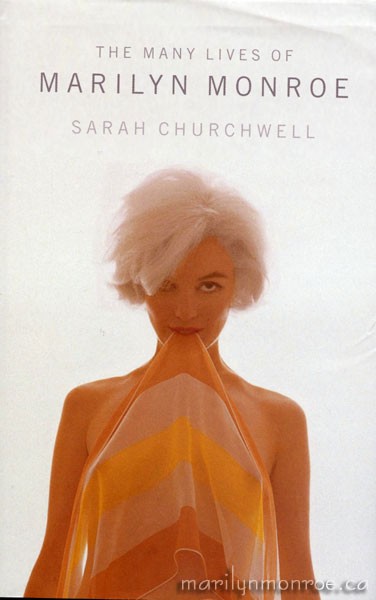 |
This is not a typical biography but instead the author examines the other major biographies that have been written about Marilyn. I'm not a bio fan to begin with so this book really isn't my cup of tea. |
||||||||||||||||||
|
|||||||||||||||||||
| |||||||||||||||||||
|
BOOK REVIEW BY DAVID MARSHALL The one thing I must say about Sarah
Churchwellís new Marilyn book, it sure does have a cool cover. But then I
would need to add that the old saying about not being able to judge a book by
its cover has not been disproved by the publication of ìThe Many Lives of
Marilyn Monroeî. The premise of the book is
wonderful and one that is sorely needed: a steady comparison of all of the
material that has been written about Monroe, highlighting the conflicting
reports, ranging from her childhood all the way to her death, in hopes of
finding some glimpse of truth between the lines of the hundreds of books and
articles that have covered the life and death of one of the 20th
centuryís most intriguing figures. The premise is elaborated on in the inside
flap of the dust jacket: ìPeeling back the fantasies, fallacies and falsehoods
that have colored the portraits of Monroe, Churchwell uncovers the shame,
belittlement, and anxiety we bring to the story of the woman we supposedly
adore.î That should be the heads up for anyone hoping to get an in-depth study
of the many conflicting stories surrounding most every aspect of Marilynís
life. For the focus is not so much on trying to figure out which stories are
true and which are urban legends, but on what ìweî, the fans and the reading
public, bring to the story with all of our own cultural baggage and individual
perceptions of the Monroe saga. Sarah Churchwell is a ìcultural
criticî. Educated at Vassar and Princeton and now a professor at University of
East Anglia, Churchwellís fascination is not so much with the various ways
Marilynís story has been told and twisted along the way but in how people
perceive Monroe and make their own choices of what to believe among the ìmany
livesî. Unfortunately, for me in any case, while the premise is interesting,
it wasnít what I wanted. And to be completely honest, Churchwell is not an
author I could say I enjoyed reading. As a social commentator, a cultural critic
and a professor, Churchwellís way of communicating is often tough going. When
this reader was yearning for a more ìletís sit down and talk this thing
throughî approach, I found myself instead with the feeling that I should be
taking notes and trying to figure out what the hell sheís talking about later
as I was sure there was going to be a test. Still, there are passages in the
book that are enlightening and highly recommended. Her discussion of the
ìtruth in fictionî of Joyce Carol Oatesí ìBlondeî is delightful,
carefully going through the work of the revered novelist and seeking out the
kernels of truth in Oatesí fictional account of a famous American icon. The
same goes for the battle between Robert Slatzer and Donald Spoto as Churchwell
tries to be as kind as possible while pointing out what likely is fiction
presented as fact by both authors. A little less lecture and speaking
on my level would have been appreciated. I wonít admit that I am stupid, in
fact I figure myself to be a fairly articulate and well-read individual. But
when faced with a sentence such as ìThe inner child of the past is an
extremely literal version of the idea that identity lodges discretely inside us,
the Cartesian pilot inhibiting the ship of the body, although the inner child is
a stowaway, less pilot than hijacker and suicide bomber,î I have to admit I
stop, re-read and still lose my way halfway through. But this is a book review. So
hereís the questions: Would I recommend this book? Yes. Would I say I enjoyed
it? Not really. But did I get anything out of it? Yes. Overall, was it worth it?
Yes. Maybe we should just be grateful for the
fact that the book is solid proof that Marilyn Monroe is no longer being brushed
off as the dumb blonde she was so long taken as. She now generates serious
consideration and hard-going scholarly dissertations. That should be applauded.
The decision is up to you however if you want to get quite that serious. |
|||||||||||||||||||
